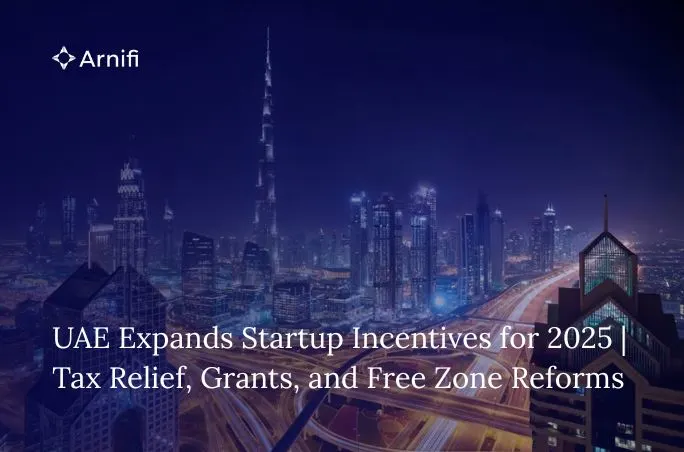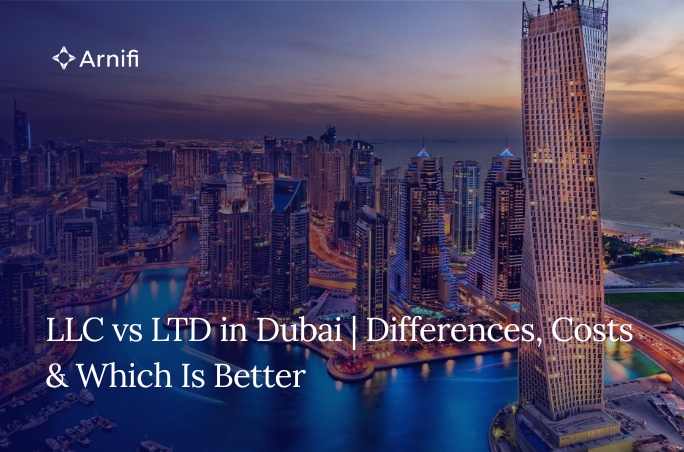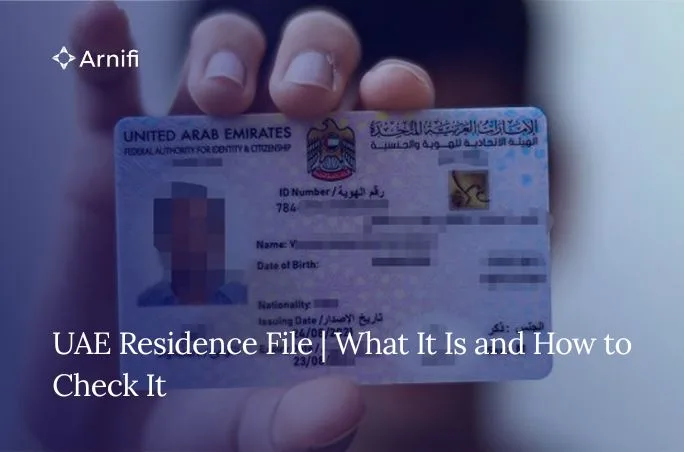UAE Expands Government Incentives to Boost Startup Growth in 2025
by Ishika Bhandari Oct 29, 2025  7 MIN READ
7 MIN READ

Table of contents
In 2025, new initiatives will be introduced in the UAE to further enhance its startup economy, offering 0% tax relief, funding programs, free zone licensing packages, and innovation support, thereby positioning it as one of the best countries in the world for entrepreneurs.
The UAE remains a prime location for starting a business, and 2025 brings a fresh flavor to the country with new government initiatives aimed specifically at helping entrepreneurs, paving the way for innovation and further accelerating growth for startups within the sector.
Keep all obligating measures of no tax and tailor-made packages of free zones, and the UAE firmly anchors itself as a growing, future-oriented entrepreneurial ecosystem. The measures in government reform are just the fruits of a long-term plan for establishing a diversified economy based on innovation.
1. Small-Business Relief and Tax Incentives
Small Business Relief has been continued with a corporate tax rate of 0% for businesses authorized under AED 3 million annual gross revenue, which focuses on the UAE startup-provisional bills in 2025. The policy significantly reduces the financial burden of early-stage investments, giving startups enough room to invest profits toward growth, technology, and human capital.
In addition, startups with revenues below the VAT registration threshold are exempt from registering for VAT and filing requirements. This exemption facilitates cutting down on operational costs and administrative complexity for early-stage businesses during their formative years.
Says the UAE Ministry of Finance, “These measures are designed to ensure that small enterprises can grow without being constrained by heavy tax obligations.”
2. Funding, Grants, and Accelerator Programs
Various UAE Government programs and initiatives offer support, mentorship, and networking opportunities to young companies, and they are huge and diverse. The programs help bridge the gap from idea to commercial value while connecting startups to investors and innovation hubs.
A look at some of the leading programs:
- Mohammed Bin Rashid Innovation Fund (MBRIF): It gives loan guarantees, an accelerator program, and mentorship to innovative startups to obtain finance and scale
- Dubai SME Fund: This fund assists Emirati entrepreneurs through interest-free loans of AED 1 million with flexible repayment schedules and grace periods to assist them in the early stages of their businesses
- Khalifa Fund for Enterprises: The fund is focused on Emiratis, combining financial support with training and mentorship. The “Ibtikari” program extends specialized support to seed- and early-stage ventures
- DIFC FinTech Fund and FinTech Hive: The funds provide capital support and access to the accelerator and assistance regarding regulatory issues for emerging startups in FinTech, RegTech, and InsurTech
- Abu Dhabi Investment Office (ADIO): It offers grants, rebates, and co-investments through ADIO to startups working in AI, deep tech, sustainability, and biotechnology. Facilitates the relocation of international startups to Abu Dhabi
- Sharjah Entrepreneurship Center (Sheraa): Provides mentorship and accelerator programs together with equity-free grants, primarily to startups within the creative or social impact sectors
AED 2 billion is said to have been allocated by the UAE for seed financing and loan guarantees to support entrepreneurship, according to the latest statistics. It can already be seen that such initiatives have had a tangible impact, with startups raising more than USD 87 million so far through Sheraa-type initiatives.
3. Free Zone Licensing and Startup Packages
The free zones in the UAE have historically been one of the premises for its pro-business policies. In 2025, these zones will initiate flexible licensing packages with a more startup-and freelancer-oriented approach.
Some key attractive incentives include the following:
- Reduced licensing fees and affordable setup packages for entrepreneurs
- Freelancer and incubator licenses that provide coworking spaces and lower visa and office costs
- Simplified incorporation procedures with minimal documentation and capital requirements
- Virtual office options for scaling up operations digitally for startups before having one physically
- Licensing duality, allowing companies to operate both in the free zone and within the UAE mainland, is regulated by specific laws
- Dubai Silicon Oasis (DSO), Sharjah Media City (Shams), RAKEZ, IFZA, and DMCC are exemplary free zones, with great enhancements in their startup ecosystem offerings, providing seamless access to infrastructure, coworking spaces, and innovation clusters
These reforms have given more reasons to entrepreneurs to consider free zones, as they expect more ease with regulations, 100% ownership, and the opportunity to market their products internationally.
4. Innovation Ecosystem: Incubators, Visas, and Banking Support
The UAE startup ecosystem derives its cohesion from a complex web involving incubators, visa reforms, and banking support to enable entrepreneurs to scale efficiently.
Incubators and Accelerators
Big platforms such as Hub71, Sheraa, DIFC FinTech Hive, and in5 provide startup support in the form of mentorship, workspace, and access to investors. A lot of these incubators work in collaboration with local universities and international partners, thus smoothing the transfer of local innovation occurrences into global opportunities.
Immigration and Visa Incentives
To lure global talents, the UAE unfolded a variety of immigration pathways for entrepreneurs and skilled professionals, namely, Startup Visa, Freelance Visa, and Golden Visa. This set of long-term residence options allows founders and their employees to settle down, with a vision of sustainability in the country.
Banking and Financial Infrastructure
An increasingly significant feature of banks in the UAE is the packages of support to startups, whereby they provide simple account setup with digital integration and low transaction fees. The framework here assists in making tool interventions for startups for effective cash flow management and online transactions.
5. Sector-Specific Incentives and Industry Focus
The incentive framework of the UAE is geared towards the development of priority industries that correspond to the national economic goals. Startups that are primarily into any of these priority sectors will have improved access to funding, flexible regulations, and infrastructure provisions.
The most rapidly rising industries include the following:
- Finance and Artificial Intelligence: By creating innovation sandboxes, fintech funds, regulatory frameworks, and experimentation in digital finance, blockchain, and data analytics, it covers everything besides the aforementioned.
- E-Commerce and Logistics: Well-linked with the most excellent ports and airports, the sound infrastructure of logistics services keeps the customs duties and warehousing costs at bay and enhances the competitiveness of startups for cross-border operations.
- Creative Media: Startups in media, like design and digital content, can benefit from regulatory flexibility and specialized talent pools using creative clusters such as Shams and twofour54.
- Advanced Manufacturing and Green Technology: The industrial free zones and research and development grants promise to meet the UAE’s goals of sustainability and industrialization in the next decade.
A Bigger Picture
The UAE is emerging as one of the fastest-growing startup ecosystems in MENA due to all these incentives. There are more than 1,500 active startups in the country, and as the incoming foreign direct investment grows, so does its case for being an innovation hub globally.
Hub71 in Abu Dhabi continues to fulfill its mandate by winning over tech startups and investors from diverse parts of the world to the capital. The UAE’s fast and friendly legal framework has cooperated with its advanced digital infrastructure to establish itself as a regional hub for entrepreneurship.
| Incentive Area | Key Perks | Who Benefits Most |
| Small-Business Relief | 0% corporate tax below AED 3M turnover | Early-stage startups |
| Grants & Funding | Access to MBRIF, Khalifa Fund, ADIO, DIFC Hive | Tech and innovation-based ventures |
| Free Zone Licensing | Reduced fees, virtual offices, dual licensing | FinTech, AI, and E-commerce startups |
| Incubators & Visa Support | Startup visas, mentorship, long-term residency | International founders and skilled staff |
| Priority Sectors | Green tech, FinTech, creative industries | High-growth innovators |
Outlook
The 2025 UAE business agenda illustrates the clear commitment that the UAE has toward enabling startups to thrive. The synergy of tax incentives, funding opportunities, simplified regulations, and policies in support of innovation will, therefore, all work to attract capable founders and investors from all over the world.
Ensuring that incentives align with high-potential industries and providing one of the most open business environments in the world are just a few of the ways the UAE continues to strive toward becoming a global hub for entrepreneurship and innovation.
Top UAE Packages

Related Articles
Top UAE Packages



